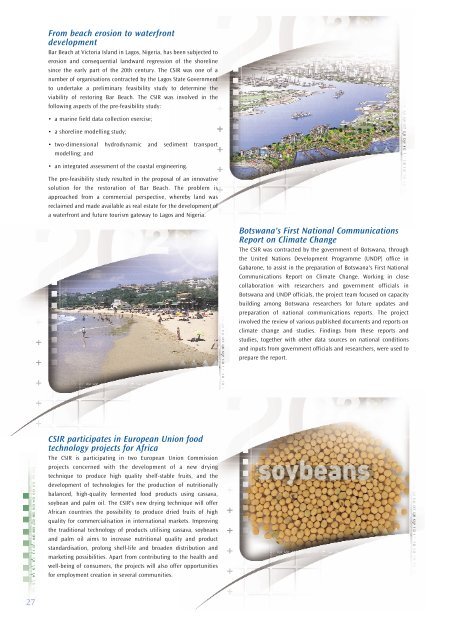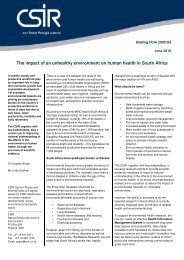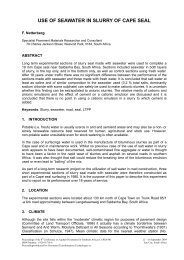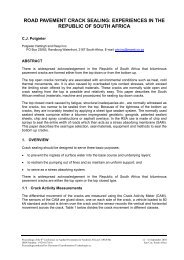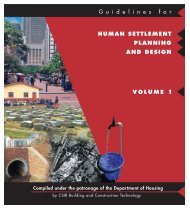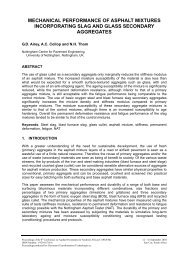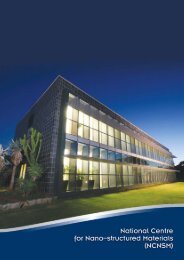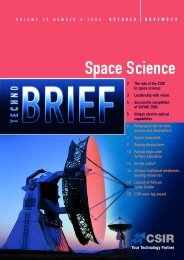CSIR Technology Impact 2002
CSIR Technology Impact 2002
CSIR Technology Impact 2002
You also want an ePaper? Increase the reach of your titles
YUMPU automatically turns print PDFs into web optimized ePapers that Google loves.
27<br />
From beach erosion to waterfront<br />
development<br />
Bar Beach at Victoria Island in Lagos, Nigeria, has been subjected to<br />
erosion and consequential landward regression of the shoreline<br />
since the early part of the 20th century. The <strong>CSIR</strong> was one of a<br />
number of organisations contracted by the Lagos State Government<br />
to undertake a preliminary feasibility study to determine the<br />
viability of restoring Bar Beach. The <strong>CSIR</strong> was involved in the<br />
following aspects of the pre-feasibility study:<br />
a marine field data collection exercise;<br />
a shoreline modelling study;<br />
two-dimensional<br />
modelling; and<br />
hydrodynamic and sediment transport<br />
an integrated assessment of the coastal engineering.<br />
The pre-feasibility study resulted in the proposal of an innovative<br />
solution for the restoration of Bar Beach. The problem is<br />
approached from a commercial perspective, whereby land was<br />
reclaimed and made available as real estate for the development of<br />
a waterfront and future tourism gateway to Lagos and Nigeria.<br />
<strong>CSIR</strong> participates in European Union food<br />
technology projects for Africa<br />
The <strong>CSIR</strong> is participating in two European Union Commission<br />
projects concerned with the development of a new drying<br />
technique to produce high quality shelf-stable fruits, and the<br />
development of technologies for the production of nutritionally<br />
balanced, high-quality fermented food products using cassava,<br />
soybean and palm oil. The <strong>CSIR</strong>'s new drying technique will offer<br />
African countries the possibility to produce dried fruits of high<br />
quality for commercialisation in international markets. Improving<br />
the traditional technology of products utilising cassava, soybeans<br />
and palm oil aims to increase nutritional quality and product<br />
standardisation, prolong shelf-life and broaden distribution and<br />
marketing possibilities. Apart from contributing to the health and<br />
well-being of consumers, the projects will also offer opportunities<br />
for employment creation in several communities.<br />
Botswana's First National Communications<br />
Report on Climate Change<br />
The <strong>CSIR</strong> was contracted by the government of Botswana, through<br />
the United Nations Development Programme (UNDP) office in<br />
Gabarone, to assist in the preparation of Botswana's First National<br />
Communications Report on Climate Change. Working in close<br />
collaboration with researchers and government officials in<br />
Botswana and UNDP officials, the project team focused on capacity<br />
building among Botswana researchers for future updates and<br />
preparation of national communications reports. The project<br />
involved the review of various published documents and reports on<br />
climate change and studies. Findings from these reports and<br />
studies, together with other data sources on national conditions<br />
and inputs from government officials and researchers, were used to<br />
prepare the report.


